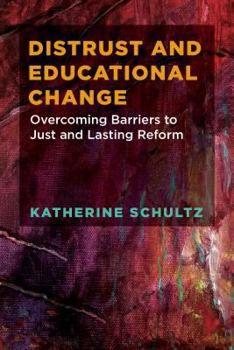Distrust and Educational Change: Overcoming Barriers to Just and Lasting Reform
Distrust characterizes much of the current political discourse in the United States today. It shapes our feelings about teachers, schools, and policies. In Distrust and Educational Change , Katherine Schultz argues that distrust--and the failure to recognize and address it--significantly contributes to the failure of policies meant to improve educational systems. The strategies the United States has chosen to enact reform engender distrust, and in so doing, undermine the conditions that enable meaningful educational change. In situations in which distrust--rather than trust--predominates, teachers and principals are reluctant to transform their educational practice. Through a set of illustrative stories , Schultz analyzes the role of distrust in the failure of educational change and transformation. By creating a taxonomy that includes three kinds of distrust--relational, structural, and contextual--she suggests ways to analyze, understand, and discuss the impact of distrust on schools, districts, and large-scale educational processes. She concludes by offering concrete recommendations for addressing distrust in classrooms, schools, and districts; discusses the roles played by teachers, principals, parents, and students in building trust; and points to schools and programs where distrust has been acknowledged and repaired successfully. By creating spaces that honor human dignity, Schultz argues, it is possible to replace a culture of systemic distrust built over time.
Format:Paperback
Language:English
ISBN:1682532976
ISBN13:9781682532973
Release Date:March 2019
Publisher:Harvard Education PR
Length:184 Pages
Weight:0.45 lbs.
Dimensions:0.5" x 5.9" x 8.9"
Customer Reviews
0 rating





